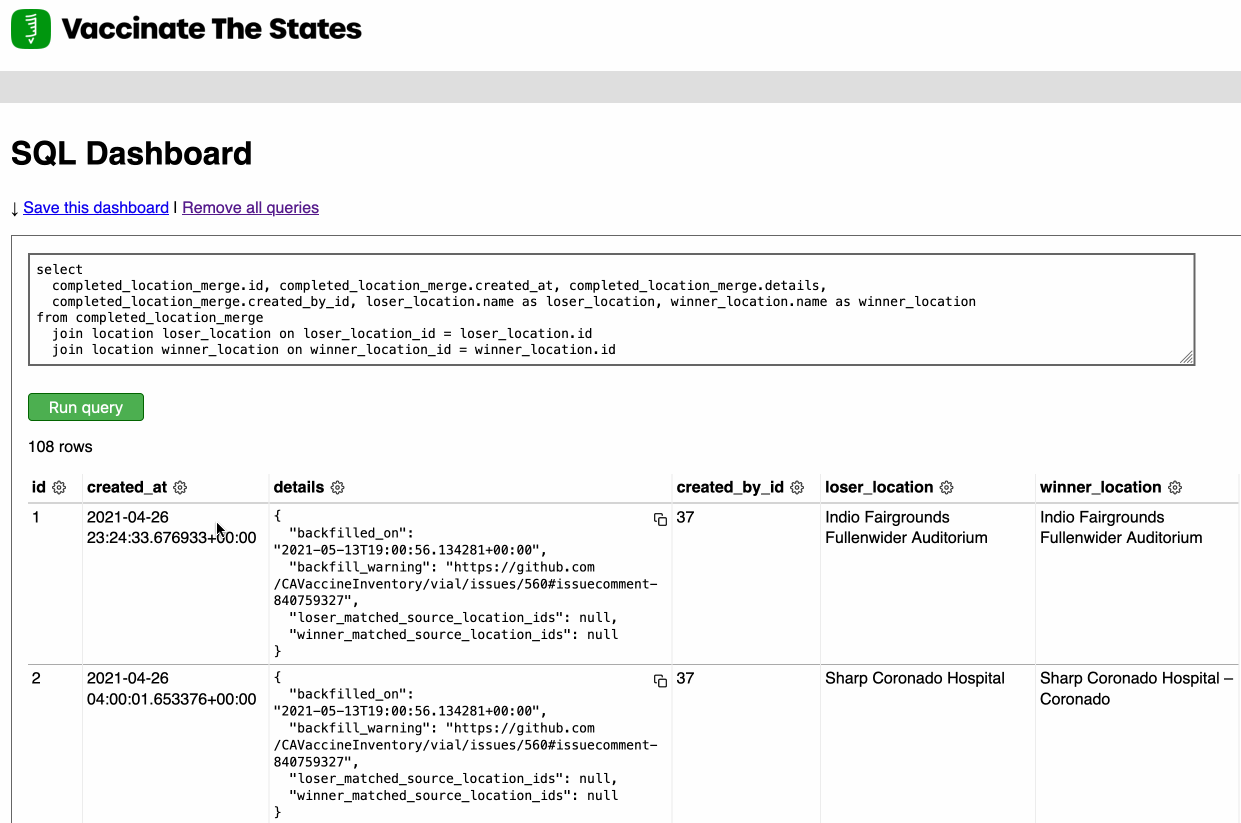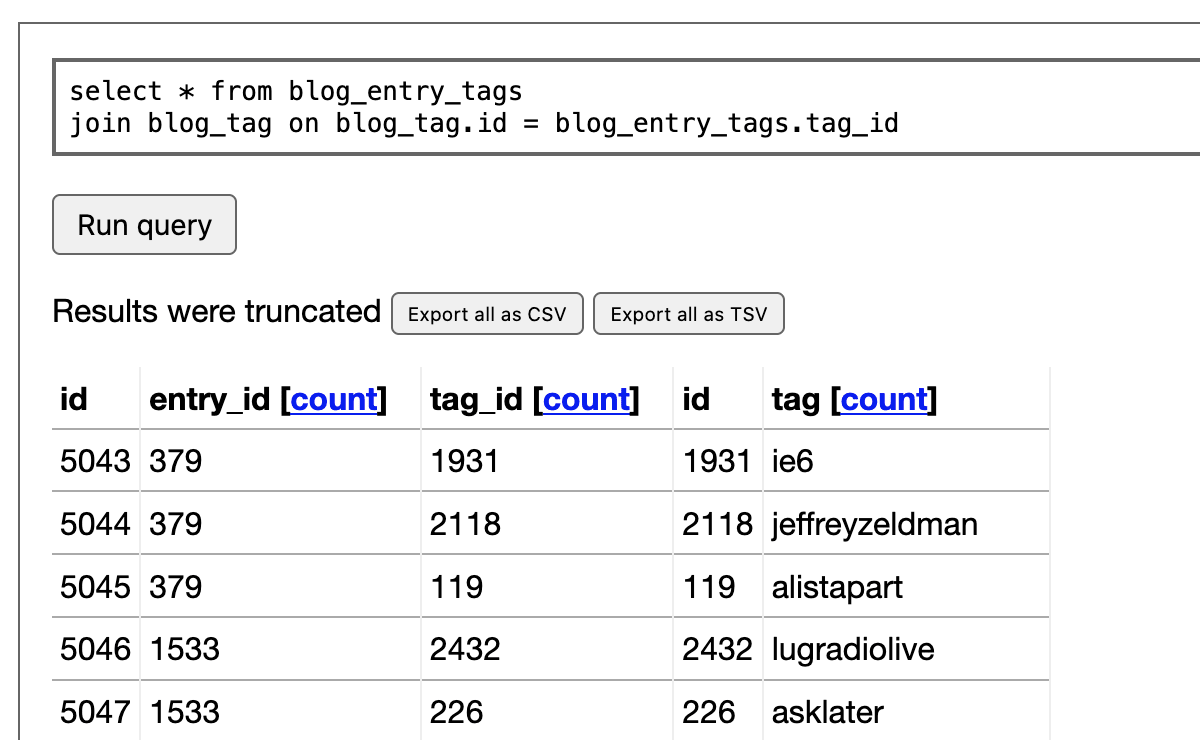Posts tagged datasette, django
Filters: datasette × django × Sorted by date
django-simple-deploy. Eric Matthes presented a lightning talk about this project at PyCon US this morning. "Django has a deploy command now". You can run it like this:
pip install django-simple-deploy[fly_io]
# Add django_simple_deploy to INSTALLED_APPS.
python manage.py deploy --automate-all
It's plugin-based (inspired by Datasette!) and the project has stable plugins for three hosting platforms: dsd-flyio, dsd-heroku and dsd-platformsh.
Currently in development: dsd-vps - a plugin that should work with any VPS provider, using Paramiko to connect to a newly created instance and run all of the commands needed to start serving a Django application.
django-plugin-datasette. I did some more work on my DJP plugin mechanism for Django at the DjangoCon US sprints today. I added a new plugin hook, asgi_wrapper(), released in DJP 0.3 and inspired by the similar hook in Datasette.
The hook only works for Django apps that are served using ASGI. It allows plugins to add their own wrapping ASGI middleware around the Django app itself, which means they can do things like attach entirely separate ASGI-compatible applications outside of the regular Django request/response cycle.
Datasette is one of those ASGI-compatible applications!
django-plugin-datasette uses that new hook to configure a new URL, /-/datasette/, which serves a full Datasette instance that scans through Django’s settings.DATABASES dictionary and serves an explore interface on top of any SQLite databases it finds there.
It doesn’t support authentication yet, so this will expose your entire database contents - probably best used as a local debugging tool only.
I did borrow some code from the datasette-mask-columns plugin to ensure that the password column in the auth_user column is reliably redacted. That column contains a heavily salted hashed password so exposing it isn’t necessarily a disaster, but I like to default to keeping hashes safe.
Announcing our DjangoCon US 2024 Talks! I'm speaking at DjangoCon in Durham, NC in September.
My accepted talk title was How to design and implement extensible software with plugins. Here's my abstract:
Plugins offer a powerful way to extend software packages. Tools that support a plugin architecture include WordPress, Jupyter, VS Code and pytest - each of which benefits from an enormous array of plugins adding all kinds of new features and expanded capabilities.
Adding plugin support to an open source project can greatly reduce the friction involved in attracting new contributors. Users can work independently and even package and publish their work without needing to directly coordinate with the project's core maintainers. As a maintainer this means you can wake up one morning and your software grew new features without you even having to review a pull request!
There's one catch: information on how to design and implement plugin support for a project is scarce.
I now have three major open source projects that support plugins, with over 200 plugins published across those projects. I'll talk about everything I've learned along the way: when and how to use plugins, how to design plugin hooks and how to ensure your plugin authors have as good an experience as possible.
I'm going to be talking about what I've learned integrating Pluggy with Datasette, LLM and sqlite-utils. I've been looking for an excuse to turn this knowledge into a talk for ages, very excited to get to do it at DjangoCon!
Weeknotes: DjangoCon, SQLite in Django, datasette-gunicorn
I spent most of this week at DjangoCon in San Diego—my first outside-of-the-Bay-Area conference since the before-times.
[... 1,184 words]Django SQL Dashboard 1.0
Earlier this week I released Django SQL Dashboard 1.0. I also just released 1.0.1, with a bug fix for PostgreSQL 10 contributed by Ryan Cheley.
[... 629 words]Django SQL Dashboard
I’ve released the first non-alpha version of Django SQL Dashboard, which provides an interface for running arbitrary read-only SQL queries directly against a PostgreSQL database, protected by the Django authentication scheme. It can also be used to create saved dashboards that can be published or shared internally.
[... 2,171 words]Trying to end the pandemic a little earlier with VaccinateCA
This week I got involved with the VaccinateCA effort. We are trying to end the pandemic a little earlier, by building the most accurate database possible of vaccination locations and availability in California.
[... 1,154 words]Bedrock: The SQLitening (via) Back in March 2018 www.mozilla.org switched over to running on Django using SQLite! They’re using the same pattern I’ve been exploring with Datasette: their SQLite database is treated as a read-only cache by their frontend servers, and a new SQLite database is built by a separate process and fetched onto the frontend machines every five minutes by a scheduled task. They have a healthcheck page which shows the latest version of the database and when it was fetched, and even lets you download the 25MB SQLite database directly (I’ve been exploring it using Datasette).
Weeknotes: datasette-auth-existing-cookies and datasette-sentry
Work on Datasette Cloud continues—I’m tantalizingly close to having a MVP I can start to invite people to try out.
[... 701 words]Logging to SQLite using ASGI middleware
I had some fun playing around with ASGI middleware and logging during our flight back to England for the holidays.
[... 2,535 words]

